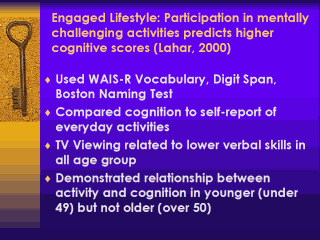 |
Now this is one thing that got a little bit of something
changing in the brain. The idea of engaged lifestyle comes out. This engaged hypothesis
will come out in a lot of literature here on predicting cognition. And here a recent study
showed that participation in mentally challenging activities predicts higher cognitive
scores as people are older. And this lady used WAIS-R vocabulary scores, a Digit Span
subtest Ė which she referred to as a memory test, and the Boston Naming Test Ė the
word finding test and compared cognition on those tests to self-report of everyday
activities. She noticed that people who do a lot of TV Viewing had the lowest verbal
skills in all the age groups and she was looking at across several age cohorts. And
although she found that engaged lifestyles to be supported in younger people up to about
age 49, it didnít hold up as she looked at the people over age 50. She still went on in
the paper, by the way, to say that this is a good example of how the engagement hypothesis
is being supported. And she was pretty enthusiastic about this in terms of general aging
at the way to look at aging success. But when I read the actual paper, it wasnít really
as optimistic, the data didnít really support the title. |
